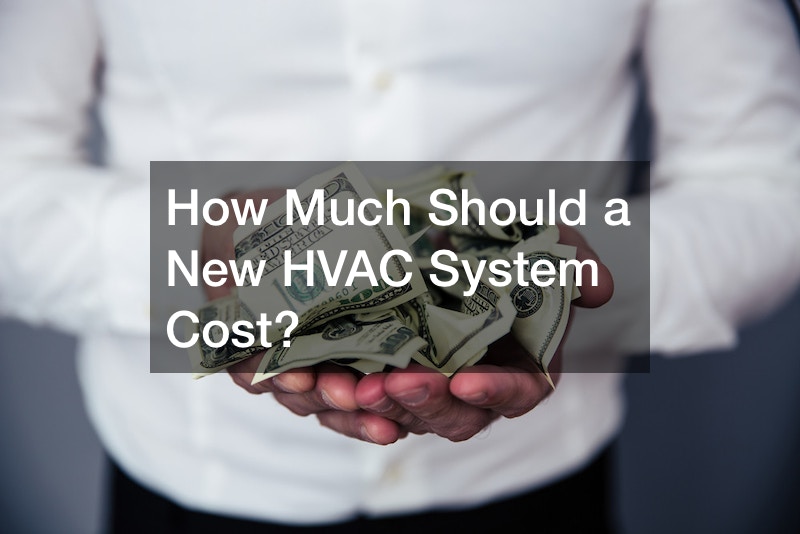
If you’re looking to replace your old HVAC system, it’s important to consider all of the benefits that come with a new one. These include energy savings, reduced ac maintenance costs, and even better indoor air quality services for your family. Contrary to popular opinion, replacing an HVAC system does not have to be expensive, especially if you plan ahead and use some simple strategies.
We’ve put together this guide on the many benefits you would get from a new HVAC installation, how much should a new HVAC system cost, and how you can reduce this cost to meet your financial stance. This would ultimately help you make sure your investment will pay off in the long run!
How Much Should a New HVAC System Cost?
After spending a ton of money on the repairs of your HVAC system, including furnace repair, you’ve probably figured that it’s about time you got that HVAC system replaced. But if the question that remains on your mind is “how much should a new HVAC system cost,” then you’ll find this useful.
The price for a new HVAC system will vary depending on your home’s exact requirements and the size of your house, as well as the type of HVAC system you need.
-
The Requirements and Size of Your Home

Size matters when it comes to heating and cooling because bigger homes have more rooms and windows than smaller ones do. This, therefore, means that they require more airflow through their ducts.
In addition to this, larger cities tend to have higher energy costs due to all sorts of factors like congestion and pollution levels—which means that those who live there need better HVAC systems than those who live in rural areas where houses are smaller or less energy intensive (i.e., no air conditioners).
-
The Type of HVAC System You Need (Central A/C versus Portable)
There are two main types of central AC units: split systems which use both indoor coils along with outdoor condensers; as well as hybrid units which combine both methods into one design. This makes them easy to install without sacrificing performance levels too much since neither method requires too many pieces from start-up until the completion timeframe.
We, however, recommend using only one type as opposed to going hybrid over the split, since these are less expensive overall and are also more aesthetically pleasing. Most homeowners prefer not to have anything sticking out from under their ceilings.
If you’re still trying to decide what your home needs are and consequently, how much should a new HVAC system cost for your home, you may want to consider inspecting how new or old your home is. If you have an older home and all you probably need is some updates, and an HVAC installation to keep it comfortable in warm weather, you would most likely not want to spend too much money on a brand-new system. In this case, you might be able to get away with paying less than what it would cost if you had just bought everything new. However, if your house was built recently or has several bedrooms and bathrooms—or all of these features—then there’s no doubt that having quality HVAC equipment is worth every penny!
Together with ventilation services, indoor air quality services, and heating and air conditioning services, you can keep the air in your home clean and just how you like it.
Although the price of a new HVAC system will vary depending on your home’s exact requirements, you’ll want to budget about $7,500 for a 2,000-square-foot home if yours needs to be replaced. This doesn’t include labor costs associated with the HVAC installation as well as installing any ductwork required as part of the entire system installation process. You’d want to make sure your air conditioning contractor includes those items in their quote before agreeing on anything else! If they don’t do this, then chances are they’ll try telling you later down payment figures which could end up costing you more money than originally quoted.
Ways to Reduce the Cost of an HVAC System

Now that you know how much a new HVAC System should cost, it is important you know that there are a few ways to reduce this cost.
The following tips could help you do this:
- Use energy-efficient appliances and lights, which can help you save money on your utility bill.
- Install a programmable thermostat in your home so that you can set it to turn on when you want it to and set it back down at night. This will help keep the temperature at an ideal level throughout the day, saving on heating/cooling costs because there will be less electricity used overall by turning off during non-peak hours when no one is around.
- Insulate any areas within your home where pipes run through walls (elevators, closets). You can do this by installing insulation inside these spaces above ground level between floors or walls onto which they run. This prevents heat loss to surrounding materials like wood beams etc., which would otherwise cause them to warm up outside before entering another room again later on.
The Benefits of a New HVAC System
A new HVAC system is very beneficial for a number of reasons and these benefits can be felt largely and would ultimately help make your home more comfortable, particularly in summer.
The main benefits of a new HVAC system are: new HVAC systems are more energy efficient, they’re quieter and don’t require as much maintenance, they’re more reliable, meaning you won’t have to worry about damage or failures in the system over time, and they have longer warranties—in fact, some new HVAC systems come with a full warranty on parts and labor for up to 5 years after installation.
Your Unit’s Efficiency Rating
Your unit’s efficiency rating is one of the most important factors when it comes to choosing an HVAC system. Efficiency ratings are determined by the SEER (Seasonal Energy Efficiency Ratio) and AFUE (Annual Fuel Utilization Efficiency).
SEER is a measure of how much energy your AC can save per year. It takes into account both indoor and outdoor temperatures, as well as your home’s size and climate zone. The higher your SEER number, the more efficient your air conditioner will be at cooling down rooms during hot weather months—and keeping them cool all year round with no extra fan usage!
AFUE stands for Annual Fuel Utilization Efficiency—this refers to how many BTUs or BTU/hrs were provided by each cubic foot of refrigerant used. However, this calculation does not take into account any additional costs associated with buying new equipment or hiring contractors who specialize in installing new systems on homes that need repairs before starting work again until after doing so has been completed successfully without any further issues arising later, down line.
Taking the time out to properly inspect the SEER and AFUE before making the decision to purchase an HVAC system could go a long way in ensuring you fully enjoy the benefits of a new AC, without spending so much on energy costs. You could ask your air conditioning contractor for some recommendations or consult with an HVAC Company.
Different Types of HVAC Systems

If you’re looking for a new HVAC system, there are many options to choose from. Here’s a quick rundown of the three most common types:
-
Split Systems (also called split ductless mini splits)
These systems are made up of two or more separate pieces that each operate independently and can be installed without having to run wires through your attic or walls. They provide better efficiency than single-pipe systems, but they’re also more expensive because they require more parts and labor to install.
-
Central Air Conditioning/Heat Pumps (CACs/HP)
These work by heating or cooling indoor air using either electricity or natural gas. This is usually carried out through an outdoor compressor connected directly to your home’s furnace or water heater. It then returns this heated/cooled air back into your home via fans in ductwork located outside your house that direct it into rooms as needed.
This process is why it is named “central,” since all heat comes from one place rather than being distributed throughout multiple rooms like with split systems.
The main advantage of using CAC, particularly as a residential air conditioner, is that CACs save money on energy costs over time. This is because they use less electricity per unit output compared with traditional furnaces equipped with standard blower motors which consume large amounts of energy, operating constantly at full power even when no one’s inside.
-
Portable Air Conditioner
Portable air conditioners are great because of how easy they are to move from room to room (as the name implies). They are free-standing and with the presence of a power outlet and access to a window where they can be powered up and release hot air with ease, they can pretty much be set up in every room. What’s even more interesting is that you can set up the portable air conditioner yourself even though you do not have in-depth technical knowledge.
The portable air conditioners are placed in a single unit and have all of their components running and operating on the inside. These kinds of air conditioners are best used in rooms where space is of importance, and are hence suitable if your goal is to cool a single room or a small area.
If you have a much smaller home, or you live by yourself, you may want to consider using a portable air conditioner as this would be saving you a lot on energy costs. You can decide what part of the room is cooling and when, and can easily move the portable air conditioner with you as you switch rooms.
Portable air conditioners work by ejecting hot air out of the room and then injecting cool air back in from the outside using either a single hose for the hot and cool air or a dual-hose, where one carries out the hot air and the other, the cool air.
A Guide to Choosing an HVAC System

When choosing a residential HVAC system, it is important that you choose a system that is the right size for your home. Before buying an HVAC unit, take into consideration how much square footage you have and what kind of climate conditions you’re likely to face. If you’re planning on remodeling or adding an extra room, choose a larger system with enough airflow that can handle the additional heat and humidity that will be produced by the new construction.
It is also important that you choose an HVAC unit with an Energy Efficiency Rating (EER). EER is an important factor when choosing an HVAC unit because it indicates how efficient it is at cooling or heating your home in both the summer months and the winter months. An EER is also responsible for determining the overall cost-effectiveness of your residential air conditioner over time.
A low EER means less energy used per BTU (British Thermal Unit), which makes sense given how expensive electricity can be. In addition to saving money on cooling costs over time, having higher quality equipment also prolongs its lifespan by reducing wear & tear on its components due to frequent operation cycles; this increases reliability overall since it won’t need replacement soon if ever needed again.
Conclusion
While the cost of replacing an HVAC system may seem high at first, it is important to take into account all the benefits that a new one provides. The more you know about your unit’s efficiency rating and other factors, the better off you’ll be when calculating how much money will be spent on a replacement. Be sure to consider how much time and money you’re saving by not having to repair or replace your current system.



